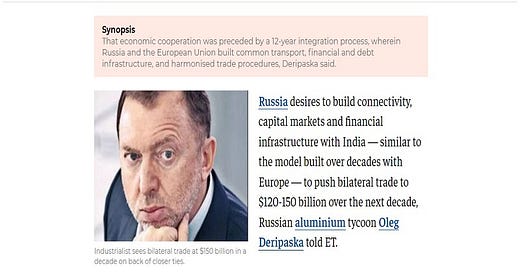A Major Russian Businessman Envisions Economic Ties With India Replacing European Ones
Deripaska is a major Russian businessman who’s regarded as exerting immense influence over his country’s economic strategy so it naturally follows that his views on this pressing issue should be afforded with the utmost of attention. While only speaking in a personal capacity, his insight nevertheless hints at how the Kremlin might intend to move forward in comprehensively expanding its economic ties with India.
Russia’s geo-economic pivot to the Global South in response to the US-led West’s unprecedented sanctions against it since the start of the ongoing special military operation in Ukraine has seen India become that Eurasian Great Power’s partner of choice. Not only did that South Asian civilization-state decisively intervene to become Russia’s irreplaceable valve from Western pressure and thus preemptively avert its potentially disproportionate dependence on China, but it also shares Moscow’s long-term vision for bilateral relations. Russia and India aspire to create a third pole of influence in the present bi-multipolar intermediary phase of the global systemic transition to multipolarity alongside Iran by transforming the North-South Transport Corridor (NSTC) into the core of this grand strategy.
These ambitious plans mean that geo-economics are driving grand strategy, which necessitates the involvement of prominent business representatives in order to breathe life into this policy. Therein lies the importance of Oleg Deripaska’s latest comments to India’s Economic Times where he shared his optimism that ties with India can eventually replace those that his country lost with Europe. Deripaska is a major Russian businessman who’s regarded as exerting immense influence over his country’s economic strategy so it naturally follows that his views on this pressing issue should be afforded the utmost of attention. While only speaking in a personal capacity, his insight nevertheless hints at how the Kremlin might intend to move forward in comprehensively expanding its economic ties with India.
In order to actualize his vision, he suggested “setting up direct trade agreements, developing new logistics routes and related infrastructure, speeding up and digitalising customs procedures, providing both sides with access to debt and capital markets, creating financial infrastructure to facilitate trade and trade financing, and streamlining central banks’ national currency-swap procedures.” Deripaska also proposed “Localising production sites in India and supplying them with Russian raw materials in return for a part of the ready-made products.” Although not explicitly reported in the interview, it should be taken for granted that the NSTC through Iran will become the primary economic conduit for facilitating Russian-Indian trade, which therefore implies the potential for joint projects there too.
It also deserves mentioning that diplomats from both Great Powers recently met to discuss expanding their cooperation in the Arctic, which constitutes part of the Russian Far East where Moscow is eager to court more foreign investments from Asian countries like India. September’s next Eastern Economic Forum (EEF) will likely see them exploring these possibilities a lot more in detail as they strive to jointly create a comprehensive geo-economic action plan for that massive region. The Vladivostok-Chennai Maritime Corridor (VCMC) can one day expand to the Arctic and thus create a complementary maritime corridor for Indian-European trade that evades the Suez Canal chokepoint exactly as the NSTC does. Even if that doesn’t come to fruition right away, India is very interested in the region’s natural resources.
It's of the utmost priority that Russia develops its far-flung territory as soon as possible, hence the eagerness in having its special and privileged Indian strategic partner take the lead in this respect. Derispaska understands the importance of comprehensively expanding bilateral economic ties, but his interview would have benefited had he talked about more about the geographic aspect thereof such as the growing role of the NSTC, VCMC, and Arctic investments. Nevertheless, his remarks for Indian media are still significant since the grand strategic vision that he elaborated upon with respect to having India one day replacing the EU in bilateral trade with Russia forms the goal that Moscow will pursue across the coming decade.
It was of course easier to create complex mutual economic interdependence between his country and the EU than it will be to do so with India owing to geographic reasons but that doesn’t mean that his vision is unattainable. Rather, one can argue that it’s even more noble than his predecessors’ who were responsible for creating the first-mentioned but ultimately ill-fated regional economic community since it involves South-South cooperation and is thus advancing the global systemic transition to multipolarity instead of seeking to turn Russia into a member of the US-led West’s Golden Billion. Granted, Moscow never intended to subordinate its interests to Washington and solely sought mutually beneficial cooperation with equal respect, but it’s still better than it’s focusing on the Global South nowadays.
The more that Russian-Indian economic relations expand, whether bilaterally or through third countries like their shared Iranian strategic partner, the quicker that multipolarity will entrench itself in Eurasia. It’s already a force to be reckoned with and an irreversible one at that, but it requires more heft with respect to the geo-economic dimension of Russian grand strategy in order to have a more meaningful impact on everyone’s lives. That’s why it’s so important that this major Russian businessman with key influence over his country’s economic policy shared his ambitious vision for trade ties with India. It’ll of course take time to enter into effect, but just like Rome wasn’t built in a day, nor will the Multipolar World Order be either or the third pole of influence that Russia, India, and Iran want to jointly create.




